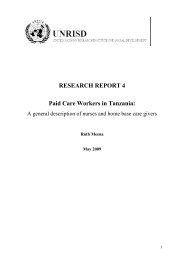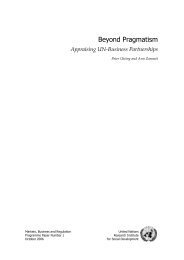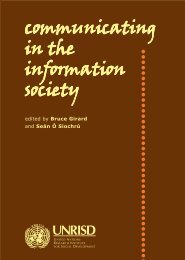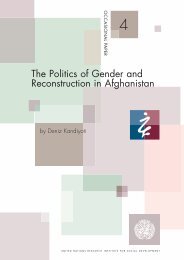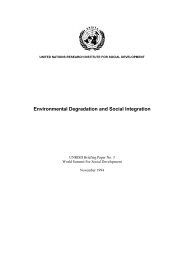Women's Employment - United Nations Research Institute for Social ...
Women's Employment - United Nations Research Institute for Social ...
Women's Employment - United Nations Research Institute for Social ...
You also want an ePaper? Increase the reach of your titles
YUMPU automatically turns print PDFs into web optimized ePapers that Google loves.
Women’s employment in the textile manufacturing sectors of Bangladesh and Morocco<br />
attitude toward unionization in the RMG industries.<br />
The industrialists’ apprehensions are also based in part on their<br />
perceptions of industrial conflicts in the public sector, particularly in<br />
terms of the workers’ organizational strength and the militancy of<br />
some of their professional trade union leaders, which is in turn linked<br />
with these leaders’ political aspirations. It would not be inappropriate<br />
to mention here that the workers and their unions in the public sector<br />
industries of Bangladesh often display the characteristics of early<br />
industrial development, including multiplicity of unions, serious interunion<br />
rivalries, and allegiance of workers to different unions (Khan,<br />
1986). But then, the reason <strong>for</strong> the multiplicity of unions as well as<br />
inter-union rivalries may partly lie, as Khundker correctly points out,<br />
in the management structure of the public sector industries, which is<br />
often centralized and is normally in the hands of civil servants. Civil<br />
servants are generally perceived as being unsympathetic to labour<br />
causes by union leaders. And this, along with a somewhat restricted<br />
collective bargaining mechanism — since wages and other benefits<br />
are determined by National Pay Commissions (<strong>for</strong> government and<br />
public sector employees) and National Wages and Productivity<br />
Commissions (<strong>for</strong> industrial workers in the public sector) — influence<br />
the trade union leaders to rely heavily on political parties in pursuing<br />
their objectives (Khundker, 1997).<br />
There is also another factor which one needs to take into<br />
consideration in discussing the state of affairs of the unions in both<br />
public and private sectors — their lack of funds. In Bangladesh,<br />
workers generally pay their union dues only at those times when<br />
their demands are being raised. Some union leaders there<strong>for</strong>e try to<br />
raise disputes simply <strong>for</strong> the purpose of refurbishing their union<br />
funds.<br />
At any rate, in order to cross-check the in<strong>for</strong>mation provided by<br />
the federation and unit union leaders regarding the issues related to<br />
unionization, as well as to get an impression of their possible response<br />
in this sensitive matter, we tried to interview the owners of all of our<br />
28 respondent factory units. However, we were able to interview only<br />
11 garment factory owners. Ten owners flatly refused to give any<br />
appointment <strong>for</strong> interviews. Nor were they interested in either<br />
contradicting or confirming the in<strong>for</strong>mation provided by the<br />
federation and unit union leaders regarding industrial disputes in<br />
their respective factories despite our sending that in<strong>for</strong>mation to them<br />
in writing. Two owners indirectly refused to give interviews by not<br />
keeping appointments. Five owners were out of the country during<br />
our survey and could not be contacted.<br />
204




